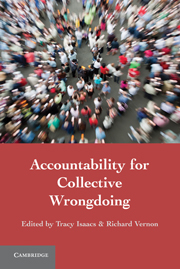Book contents
- Frontmatter
- Contents
- List of Contributors
- Acknowledgments
- Introduction
- PART I COLLECTIVE ACCOUNTABILITY IN INTERNATIONAL LAW
- 1 Collective Responsibility and Postconflict Justice
- 2 State Criminality and the Ambition of International Criminal Law
- 3 Punishing Genocide: A Critical Reading of the International Court of Justice
- 4 Joint Criminal Enterprise, the Nuremberg Precedent, and the Concept of “Grotian Moment”
- 5 Collective Responsibility and Transnational Corporate Conduct
- 6 Collective Punishment and Mass Confinement
- PART II DISTRIBUTING ACCOUNTABILITY
- Index
6 - Collective Punishment and Mass Confinement
Published online by Cambridge University Press: 05 June 2012
- Frontmatter
- Contents
- List of Contributors
- Acknowledgments
- Introduction
- PART I COLLECTIVE ACCOUNTABILITY IN INTERNATIONAL LAW
- 1 Collective Responsibility and Postconflict Justice
- 2 State Criminality and the Ambition of International Criminal Law
- 3 Punishing Genocide: A Critical Reading of the International Court of Justice
- 4 Joint Criminal Enterprise, the Nuremberg Precedent, and the Concept of “Grotian Moment”
- 5 Collective Responsibility and Transnational Corporate Conduct
- 6 Collective Punishment and Mass Confinement
- PART II DISTRIBUTING ACCOUNTABILITY
- Index
Summary
Due process rights are normally discussed in the context of particular prisoners who are in detention while awaiting trial or who have been sentenced. However some refugee camps should also be treated as forms of detention, even incarceration. Furthermore, the detention or confinement is itself especially problematic given its link to collective punishment. In such cases, what I will call Magna Carta legacy rights, those procedural rights that have been recognized as fundamental since the time of Magna Carta are in need of special protection not commonly recognized. In this chapter, I want to consider the relationship between collective responsibility and collective punishment by considering mass confinements of such people as those in detention while waiting extradition and those people who are forced into refugee camps.
Collective responsibility plays a prominent role in the supposed justification of detention imposed on a group when some of its members pose security threats and it is difficult to sort out who poses serious threats versus those who merely might. The United States used this rationale for incarcerating large numbers of people found on the “battlefield” in Afghanistan and sending them to prison in Guantanamo. Likewise, when the civil war in the Sudan reached a certain tipping point, large numbers of people were punished by being forced into refugee camps. I examine both sorts of arguments, finding them to be seriously flawed. I look to the debates in the Just War tradition and to contemporary international law for guidance.
- Type
- Chapter
- Information
- Accountability for Collective Wrongdoing , pp. 169 - 190Publisher: Cambridge University PressPrint publication year: 2011
- 1
- Cited by

